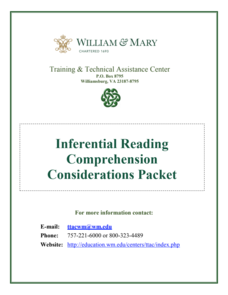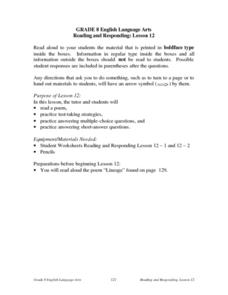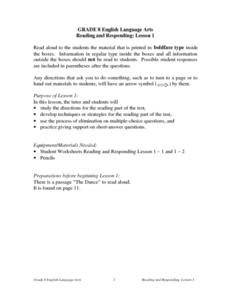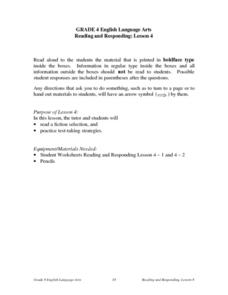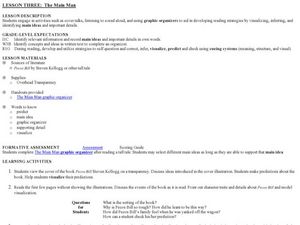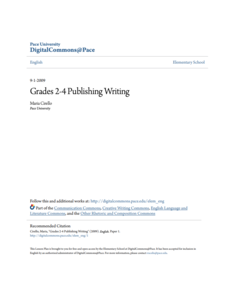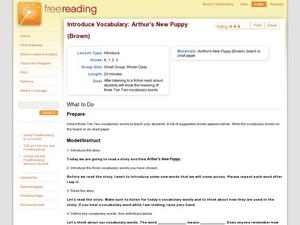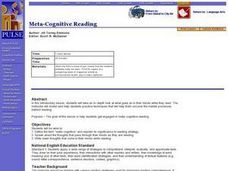Curated OER
Questioning
Practice making predictions by looking at the cover of a book. You can use The Hungry Thing, as suggested here, or any other book you may be reading in class. Use the predictions to talk about good reading strategies. A chart is included...
William & Mary
Inferential Reading Comprehension Considerations Packet
Don't forget to read between the lines! Educators learn tips and activities to help scholars learn to infer to increase reading comprehension. Activities suggested include think alouds, backwards words, and who's who. the packet includes...
Ontario
Reading Graphic Text
Do students really need to be taught how to read cartoons, comic books, and comic strips? Yes. Just as they need to learn how to read other forms of graphic text such as diagrams, photos, timetables, maps, charts, and tables. Young...
Curated OER
Introduce: Summarizing Narrative Text
When scholars re-tell a story, do they boil it down to important details in a logical order? Practice summarizing narratives using this think-aloud strategy, which is scripted here for your convenience. After explaining why this is an...
Curated OER
Annie and the Wild Animals
Here is a reading comprehension lesson in which learners predict the story plot of Annie and the Wild Animals, by Jan Brett, after viewing the cover. They listen to the story, and answer story structure questions during and after the...
Curated OER
My Antonia: Directed Reading Thinking Activity
Walk your pupils through the beginning of My Antonia by Willa Cather with a read-aloud-style activity. The goal is to make predictions and back them up with textual evidence.
Curated OER
Reading and Responding -- Lesson 12
Fourth graders work independently or in a small group to (1) practice test taking strategies, (2) practice using story details, and (3) use critical thinking skills. Reading passage, comprehension questions, and teacher script are...
Curated OER
Reading and Responding -- Lesson 1
Fourth graders work individually with a tutor or teacher and (1) read a fictional passage, (2) practice finding key words in questions, and (3)practice using test-taking strategies. Reading passages are provided.
Curated OER
Reading and Responding -- Lesson 4
Fourth graders work individually with a tutor or teacher to (1) read a fiction selection, and (2) practice test-taking strategies. Reading passages and comprehension questions are provided.
Novelinks
The Tempest: List-Group-Label (After Reading)
Collaborate with your class after reading William Shakespeare's The Tempest with a group labeling activity. As you note key concepts or words from the play on the board, class members suggest associations and connections to each one, and...
Curated OER
Reading Strategies: Main Idea
Identify the main idea and the supporting details of a story in a literacy resource from Discovery Education. Complete with procedures, vocabulary, and assessment activities, this is a great way for pupils to practice their outlining...
Curated OER
Self-Monitoring Strategies and Vocabulary Games
Teachers model self-monitering strategies for their high schoolers. They participate in games and artwork that help them increase their vocabulary. They also complete a crossword puzzle.
Curated OER
Journey to Topaz: Directed Reading Thinking Activity
Have you used the directed reading thinking activity in your classroom? Doubling as either a prereading strategy, or a during reading strategy, it helps readers connect the historical background of the text to the text itself. As the...
Curated OER
The Main Man
Students explore visualizing stories by completing a graphic organizer. In this reading strategy lesson, students read the story Pecos Bill by Steven Kellog and identify the setting, main characters and their interpretations. Students...
Student Achievement Partners
Eleven
Turning 11 comes with a range of emotions. Explore those emotions by reading the short story "Eleven" by Sandra Cisneros. Readers analyze the main character's reactions to the events of her day. Then, they write an essay describing what...
Pace University
Publishing Writing
Scholars become familiar with tagline literature with the help of the story, Alexander and the Horrible, No Good, Very Bad, Terrible Day by Judith Viort. After a read-aloud and whole-class discussion, leveled groups complete several...
Guam Community College
Joseph Had a Little Overcoat
Spruce up a class reading of the children's book Joseph Had a Little Overcoat by Simms Taback with this fun series of activities. Starting with a list of reading comprehension questions and key vocabulary to address during a teacher read...
Curated OER
Introduce Vocabulary: Clifford the Big Red Dog (Bridwell)
Clifford the Big Red Dog is here to introduce some new vocabulary terms in context to young readers. Although this activity is designed around Norman Bridwell's picture book, the strategies are applicable for any text. Introduce the new...
Curated OER
Introduce Vocabulary: Arthur's New Puppy (Brown)
Learn new words as you read Marc Brown's story, Arthur's New Puppy. This is focused as a vocabulary-in-context activity (though this strategy could be used with any book and set of words). Introduce the new words you will focus on:...
Curated OER
Introduce Vocabulary: Are Trees Alive? (Miller)
Explore the life inside trees as scholars learn vocabulary through Debbie Miller's informational text Are Trees Alive? Familiarize pupils with the new words they will hear like anchor, disease, awaken, harsh, and swell before reading....
Curated OER
Keywords: A Memorization Strategy
Here is a fabulous, five-page lesson plan on how keywords can help a reader with his/her reading comprehension. After a teacher-led discussion, pupils pair off with each other and work together to identify the main idea in a passage of...
Curated OER
Charlotte's Web
Fourth graders focus on fluency by reading the book Charlotte's Web. In this reading strategies instructional activity, 4th graders partner read, do guided reading, and independent reading to increase fluency. Students use Venn Diagrams,...
Curated OER
Meta-Cognitive Reading
Learners define the term "meta-cognitive" and explain its significance to reading strategy. They speak aloud the thoughts that pass through their minds as they are reading and write down thoughts that come to their minds while reading.
Virginia Department of Education
Identifying the Main Idea in Fiction
Discovering the main idea in fiction is like uncovering buried treasure; one must persevere to locate it, and the reward is priceless. Scholars delve deep into leveled stories using three questions to aid in identifying the main idea.



